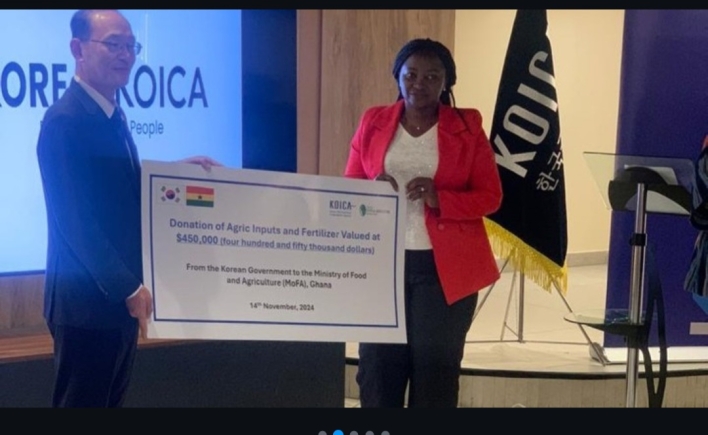
KOICA Rice Value Chain Project in Central Region officially ends
The Rice Value Chain Project, an $8 million initiative funded by the Korea International Cooperation Agency (KOICA), has officially ended on November 14, 2024, at a ceremony held at the Lancaster Hotel in Accra.
The project, which spanned five years (2020–2024), aimed to improve the livelihoods of farmers and other value chain actors in the Central Region of Ghana.
The event was graced by notable dignitaries, including the Korean Ambassador to Ghana, Park Kyongsig, the Central Regional Minister, Justina Marigold Assan, Municipal and District Chief Executives (MMDCEs) from the five beneficiary districts, representatives from the Ministry of Food and Agriculture, implementing partners, and members of farmer-based organizations.
Implemented with support from the Ministry of Food and Agriculture and other partners, the project achieved remarkable results in the Central Region.
Rice yields increased from 2.1 metric tonnes per hectare to 4.7 metric tonnes per hectare, a 223% improvement. Farmer incomes also rose significantly, from 4.887% to 15.747%, marking a 322% growth.
Other notable outcomes included the construction of a rice mill factory, the development and launch of a rice brand, and the production and distribution of high-quality seeds.
Additionally, demonstration plots were installed to enhance agricultural practices, while capacity-building programs were organized to support farmers and other stakeholders in the rice production value chain.
These milestones collectively contributed to enhancing the rice value chain in the Central Region and positioning it as a hub for quality rice production.
Speaking at the closing ceremony, Central Regional Minister Justina Marigold Assan expressed her gratitude to the Korean government for their support.
She emphasized the project's impact on the region, which has long been considered one of the poorest in Ghana.
“This initiative has brought hope and progress to our region. We urge KOICA and its partners to consider introducing new projects to sustain the gains made and continue transforming lives in the Central Region,” she stated.
The Korean Ambassador urged beneficiaries and stakeholders involved in the Rice Value Chain Project to adopt and maintain best practices that would guarantee the sustainability of rice farming in the region. He emphasized the importance of ensuring that the produce meets high standards, not only to enhance local food security but also to position it on the global agricultural market.
The ambassador highlighted that such efforts would create opportunities to attract additional strategic investors who could bring in much-needed resources and expertise to further bolster the industry. “This is the only way we can sustain the momentum and ensure that the project’s impact extends far beyond its initial scope,” he said.
Although the official timeline of the project has concluded, the ambassador reaffirmed his commitment to its progress.
He pledged to continue monitoring and supporting the initiative to maximize the benefits of the $8 million investment.
To ensure the project's sustainability, Korean Ambassador Park Kyongsig handed over agricultural supplies worth $450,000 to project beneficiaries.
The Central Regional Minister received the supplies on behalf of the stakeholders, emphasizing the importance of leveraging this foundation for even greater impacts in the years ahead.
